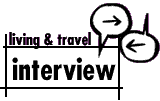
Sharron Wood, Berkeley Guides
interviewed by Michael Agger on September 25, 1996
Tripod is proud to be the online home of the Berkeley Guides. Browse the Europe Guide right now, and look for USA and Central American guides in the near future!

Sharron Wood is the Executive Editor of the Berkeley Guides. With the guiding motto of "On the Loose, On the Cheap, Off the Beaten Path," student writers and editors at the University of California at Berkeley research and produce these well-informed travel guides every year.
Tripod: What is the underlying philosophy of the Berkeley Guides?
Sharron Wood: We try to write travel guides that appeal to alternative travelers, people who either do not have a lot of money, or better yet, even if they do have a lot of money, have realized that traveling on a budget is the best way to go, because the less you spend the more you get to know about a place.
What kinds of information are your writers looking for when they are out on the road?
SW: Clearly, there is a lot of nitty-gritty information that people need to know -- the hours of the tourist office, how much the trains cost, where the train station is. Those kinds of details are essential to any travel guide. On top of that, there are a couple of things we are looking for. First of all, we try to find local places that are not overrun by tourists, places where you are not going to find fifty people clutching a "Let's Go." In order to do that, we make a lot of contact with students who live in the cities we are covering. We try to get our writers to meet up with locals and ask them where they go to dinner as opposed to where all the tourists go to dinner.
We also give people information that will help them enjoy their trip more. That kind of information includes the politics, the history, or the culture of a region. For example, in Central America and Eastern Europe, the political situation has an impact on a visitor's life. You cannot understand why Romania is the way it is today unless you know at least a little bit about Ceausescu's regime and the architecture that went up when he was in power, and how the people feel about it now that he is gone.
Our purpose is not too write a history book on each of these topics, but it is important to understand what shapes the lives of the people who live where you are traveling. So whether it is the latest shenanigans of Jacques Chirac detonating nuclear bombs in the Pacific Rim, or the Zapatistas in Mexico, we feel that these details give a historical and cultural context to the places being visited by our guides.

Tripod: What kinds of concerns are particular to budget travelers that the Berkeley Guides make a point to address?
SW: Our focus is towards a student crowd, but that being said, we get a huge response from people who are in their 30s, 40s, 50s, professional people, retirees -- it's a pretty wide group of people we address. As far as the kinds of information our audience is interested in, clearly they want to find out ways to save money. If you travel in the UK or the States, it's pretty difficult to get by without spending a lot of money. Berkeley readers are also looking for places, restaurants, and attractions that are really "of-the-moment." Since we update our books every year, we try to keep the selection fresh. Students who are going to bars in Seattle want to know where the new music is being played, not where last year's grunge is. They want to know the newest and best microbreweries. We are really concerned with what is important now, not last year.
Tripod: What kinds of experience typify the localized, up-to-date information offered in the Berkeley Guides?
SW: Well, I think our books as a whole do a good job of presenting our travel philosophy. Thinking specifically of Romania, one of our writers had met an older woman who son had been killed in the violence there. She gave him real, heartfelt accounts of what the history of the country had been for the past five years. This kind of personal information finds its way into our guides.
Another writer who worked on the Czech Republic chapters comes to mind. She was actually Czech and would meet up with her friends and learn a lot of quirky things about the culture. For example, she was surprised when she was taking a train that the conductor issued a little ticket for her dog. In the United States, this would never happen, but in some ways it's wonderfully practical: the dog is there, he's on the train, he gets a ticket. Those are a couple of examples of how meeting people teaches you how things are thought of or done very differently than in the States. It is a simple thing to say, but a difficult thing to experience.
Tripod: There are many different way to travel. How do you imagine people using your guides?
SW: The best way to travel is not to follow your guidebook religiously. To do that is to follow someone else's prescribed route and not to blaze your own trail. We try very much to cover things that are off the beaten track, to cover towns that don't have a lot of tourists, to cover bars where you will find locals instead of other travelers. That said, there is only so far off the beaten track you can get with a travel guide. The very fact of these destinations being published is going to encourage people to go there. We suggest that people visit a few big cities, but also get out on their own. At some point, you have to get on a train and get off at where it happens to drop you off and just enjoy life in that place for a while.
As well as giving specific information on hotels and restaurants, we also try to tell you where to get that information. We do not have the room in the books nor the resources to tell you about every town and pitstop in a big national park in the south of France, but we can tell you where to get information on that park. We will tell you what organization gives you the best details. If you are adventurous, you can take our guides as a starting point, and jump off from there. Trips should be a mix of taking advantage of the information in the guides, and doing something that is totally unique to your trip.
If you are too shy, or too reliant on your travel guide, you will say things like, "I can't go stay in that town because it there are no hotels listed for that town in my book." There are plenty of places to stay! You just need to find them on your own.
